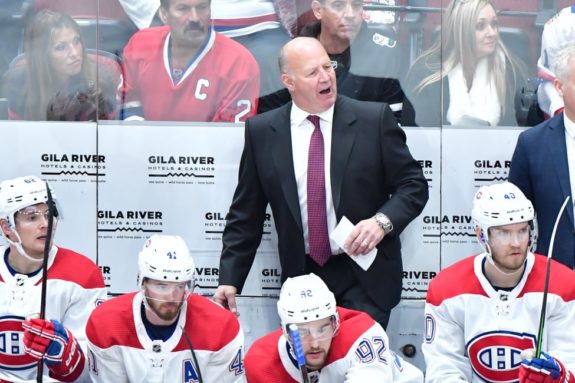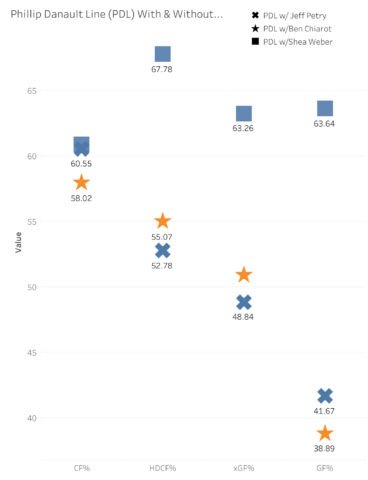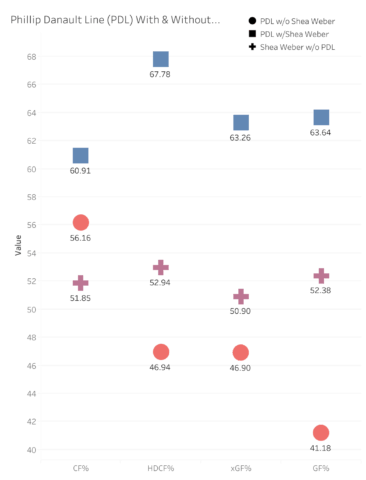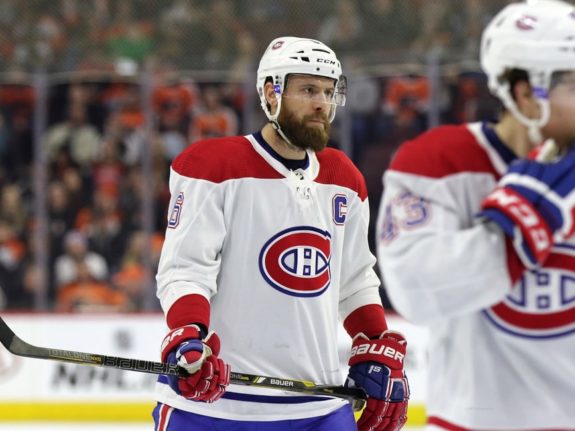Montreal Canadiens’ defenceman Shea Weber is having a standout season, putting up some great offensive numbers with 11 goals and 28 points in 34 games so far this season (from ‘Canadiens captain Shea Weber earning some high praise for his play,’ Montreal Gazette, 12/18/2019).
These numbers put Weber in good company with the league’s top-scoring defencemen, however many analysts seem to avoid giving Weber accolades on the defensive side of the puck. I also notice seemingly frequent defensive gaffs and opponents celebrating goals while Weber is on the ice.
Weber’s defensive numbers are not bad, though – they’re actually better than John Carlson’s numbers, who often is referred to as the frontrunner for the Norris Trophy. But can we trust these numbers? I, for one, wonder if the excellent Phillip Danault line (with Brendan Gallagher and Tomas Tatar) is the major contributing factor behind the team’s strong five-on-five performance, including that of Weber.
It’s not an easy task to isolate the performance of a player from his teammates, especially in the sport of hockey. There are some helpful metrics that attempt to isolate performance to some degree or another including relative teammate (Rel TM) as written about by Evolving Wild on the Hockey Graphs website.
The with or without you approach, referred to as WOWY, to attempt to isolate a player’s impact is not universally loved by the advanced statistics hockey community because there are just so many moving parts that can reduce the effectiveness of any conclusion made based on WOWY stats, including small sample sizes (low ice time). Regardless, I think it remains a useful exploratory exercise; it’s what I will use here in an attempt to isolate the impact of the Danault line and the top three defencemen on the Canadiens.
Understanding Claude Julien’s Deployment Mindset
The way to a coach’s mind is through his time on ice distribution. Using this methodology we can see that Julien favours deploying his best defenceman, Weber, with his best forward line; Danault, Gallagher and Tatar. Weber averages 5.6 minutes per game during five-on-five play with the Danault line. That’s more than any other Canadiens’ defencemen including Chiarot’s 4.79 and Petry’s 2.86. That doesn’t seem like much, but consider that the Danualt line (intact) plays approximately 10 minutes of five-on-five hockey per game. So Weber is playing with them the majority of the time during five-on-five play.

Generally, we know that Claude Julien has one of the tightest distributions of ice time in the NHL, so we can infer that Weber lining up with the Danault line frequently is not an overly purposive exercise, but it makes sense given these player’s defensive expertise and deployment (starting in the defensive zone frequently together). Regardless, they play together often, and we can attempt to isolate their playing performances.
Weber Elevates Danault Line the Best
The graphic below shows the Danault line isolated with each of the top three Canadiens’ defencemen – Weber (Block), Chiarot (Star) and Petry (X). It’s easy to see that when the Danualt line is on the ice during five-on-five play with Weber they are nothing short of incredible. Their shot attempts share (CF%), high danger chances share (HDCF%), expected goals share (xGF%) and goals share (GF%) are all above 60 percent.

With Chiarot or Petry, the Danault line maintains a strong shot attempts share, but all the other key metrics take a steep decline. The key nuances here are that the sample size is small with Petry, approximately half the total time spent with the Danault line compared to Weber, and Chiarot has been playing with Weber a lot recently. These factors should be taken into consideration when digesting this chart, but there is no doubt that Weber has a positive impact on the Danault line relative to Chiarot and Petry.
Weber’s Mountain-Sized Impact on the Danault Line
We established that Weber plays the most five-on-five minutes of any Canadien’s defenceman with the Danault line, and that he has the greatest impact on the line’s performance relative to Chiarot and Petry. Now we will further isolate Weber and the Danault line to try to establish who is having a greater impact on the other.

In the graphic above, the square represents the Danault line with Weber (5.6 minutes per game), the circle is the Danault line without Weber (4.07 minutes per game), and the plus symbol is Weber without the Danault line, in other words with all other skater combinations (8.8 minutes per game).
We can see that when they are together, Weber with the Danault line is elite. But when Weber is not with the Danault line, we see that the shot attempts share is still very good, but the other relative statistics are actually poor. I am quite surprised to learn that the Danualt line (with Gallagher a high danger shot expert) produces significantly lower high danger shots per 60 minutes (9.79) without Weber (They produce 19.9 HDCF/60 with Weber on the ice and, more importantly, only allow 8.81 HDCA/60 for an incredible 69.32 HDCF%).

What’s more convincing to me is Weber’s performance with other skaters. While the Danault line produces significantly below 50 percent shares for key metrics – HDCF, xGoals and Goals, Weber moderates his teammates like an ocean moderates extreme weather patterns. It doesn’t matter which combination of players is on the ice with Weber, the team performs well – above 50 percent shares in all key metrics as shown in the graphic above.
This is the second article I wrote this season where the numbers take some shine off of the Danault line, and my skepticism of Weber’s performance was debunked through some analytical investigation. In both cases, Shea Weber rises to the top. I’m starting to better understand his legend-like status among teammates, opponents and coaches.